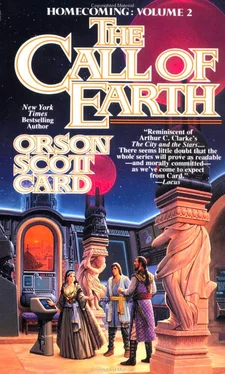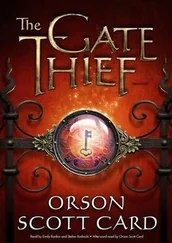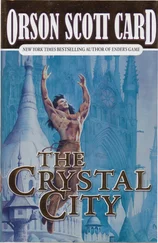Orson Card - The Call of Earth
Здесь есть возможность читать онлайн «Orson Card - The Call of Earth» весь текст электронной книги совершенно бесплатно (целиком полную версию без сокращений). В некоторых случаях можно слушать аудио, скачать через торрент в формате fb2 и присутствует краткое содержание. Жанр: Фантастика и фэнтези, на английском языке. Описание произведения, (предисловие) а так же отзывы посетителей доступны на портале библиотеки ЛибКат.
- Название:The Call of Earth
- Автор:
- Жанр:
- Год:неизвестен
- ISBN:нет данных
- Рейтинг книги:3 / 5. Голосов: 1
-
Избранное:Добавить в избранное
- Отзывы:
-
Ваша оценка:
- 60
- 1
- 2
- 3
- 4
- 5
The Call of Earth: краткое содержание, описание и аннотация
Предлагаем к чтению аннотацию, описание, краткое содержание или предисловие (зависит от того, что написал сам автор книги «The Call of Earth»). Если вы не нашли необходимую информацию о книге — напишите в комментариях, мы постараемся отыскать её.
The Call of Earth — читать онлайн бесплатно полную книгу (весь текст) целиком
Ниже представлен текст книги, разбитый по страницам. Система сохранения места последней прочитанной страницы, позволяет с удобством читать онлайн бесплатно книгу «The Call of Earth», без необходимости каждый раз заново искать на чём Вы остановились. Поставьте закладку, и сможете в любой момент перейти на страницу, на которой закончили чтение.
Интервал:
Закладка:
"My husband is waiting for me inside," said Thirsty, though not until she heard herself say the words did she realize it was true.
"Your husband will have to wait," said a soldier.
"Or take a lover," said another, and they laughed.
"Or satisfy himself," said the first, and they hooted.
"We should let her in," said one of the soldiers. "What if God has chosen her?"
Immediately one of the other soldiers drew his lefthand knife and put it to the throat of the one who had spoken. "You know the warning we were given- that it's the very one that we want to allow inside who must be prevented!"
"But she needs to be there," said the soldier who was sensitive to the Oversoul.
"Say another word and I'll kill you."
"No!" cried Thirsty. "I'll go. This is not the gate for me."
Inside her she felt the urgency to enter the city increase; but she would not have this man be killed when it would not get her through the gate in any case. Instead she wheeled the horse and made her way back through the crowd, which parted for her. Quickly she made her way up the steep trail that led to the Caravan Road, but she did not bother trying the Market Gate; she made her way along the High Road, but she did not try to enter at High Gate or Funnel Gate, either. She hurried her mount along the Dark Path, which wound among deep ravines sloping upward into the forested hills north of the city until she reached the Forest Road-but she did not follow it down to Back Gate, either.
Instead she dismounted and plunged into the dense underbrush of Trackless Wood, heading for the private gate that only women knew of, that only women used. It had taken an hour for her to go around the city, and she had gone the long way, too-but there was no horsepath around the east wall, which dropped straight down to crags and precipices, and to clamber that route on foot would have taken far longer. Now the wood itself seemed to snag at her, to hold her back, though she knew that the Oversoul was guiding every step she took, to find the quickest path to the private gate. Even when she entered there, however, it would take time to make her way up into the city, and already she could hear the horns beginning their plaintive serenade. The ceremony would begin in moments, and Thirsty would not be there.
Luet moved and spoke as slowly as she could, but as she stepped and spoke her way through the ceremony, she did not have the option of doing what she desired in her heart-to stop the wedding and denounce Moozh to the gathered citizens. At best she would merely be hustled from the platform before she could say a word, as a more responsible priestess took over; at worst, she might actually speak, might be stopped by an arrow, and then riot and bloodshed would ensue and Basilica could easily be destroyed before another morning came. What would that accomplish?
So she walked through the ceremony-with deliberation, with long pauses, but never stopping altogether, never ignoring the whispered promptings of the priestesses who were with her at every turning, at every speech.
For all the turmoil inside of Luet, though, she could not see that Hushidh felt anything but perfect calm. Was it possible that Hushidh actually welcomed this marriage, as a way of avoiding life as a cripple's wife? No-Shuya had been sincere when she said that the Oversoul had reconciled her to that future. Her calm must come from utter trust in the Oversoul.
"She is right to trust," said a voice-a whisper, really. For a moment she thought it was the Oversoul, but instead she realized that it was Nafai, who had spoken as she passed near him during the processional of flowers. How had he known what words he needed to say just then, to answer so perfectly her very thoughts? Was it the Oversoul, forging an ever-closer link between them? Or was it Nafai himself, seeing so deeply into her heart that he knew what she needed him to say?
Let it be true, that Shuya is right to trust the Over-soul. Let it be true that we will not have to leave her here when we make our journey to the desert, to another star. For I could not bear it to lose her, to leave her. Perhaps I would know joy again; perhaps my new husband could be a companion to me as Hushidh has been my dear companion. But there would always be an ache, an empty place, a grief that would never die, for my sister, my only kin in the world, my raveler who when I was an infant tied the knot that will bind us to each other forever.
And then, at last, the moment came, the taking of the oaths, Luet's hands on their shoulders-reaching up to Moozh's shoulder, so hard and large and strange, and to Hushidh's shoulder, so familiar, so frail by comparison to Moozh's. "The Oversoul makes one soul from the woman and the man," said Luet. A breath. An endless pause. And then the words she could not bear to say, yet had to say, and so said. "It is done."
The people of Basilica rose from their seats as if they were one, and cheered and clapped and called out their names: Hushidh! Raveler! Moozh! General! Vozmuzhalnoy! Vozmozhno!
Moozh kissed Hushidh as a husband kisses a wife- but gently, Luet saw, kindly. Then he turned and led Hushidh down to the front of the platform. A hundred, a thousand flowers filled the air, flying forward; those thrown from the back of the amphitheatre were picked up and tossed again, until the flowers filled the space between the platform and the first row of benches.
Amid the tumult, Luet became aware that Moozh himself was shouting. She could not hear the words he said, but only the fact that he was saying something, for his back was toward her. Gradually the people on the front row realized what he was saying, and took up his words as a chant. Only then did Luet understand how he was turning his own wedding now to clear political advantage. For what he said was a single word, repeated over and over again, spreading through the crowd until they all shouted with the same impossibly loud voice.
"Basilica! Basilica! Basilica!"
It went on forever, forever.
Luet wept, for she knew now that the Oversoul had failed, that Hushidh was married to a man who would never love her, but only the city that he had taken as her dowry.
At last Moozh raised his hands-his left hand higher, palm out to silence them, his right still holding Hushidh's hand. He had no intention of breaking his link to her, for this was his link to the city. Slowly the chanting died down, and at last a curtain of silence fell on the Orchestra.
His speech was simple but eloquent. A protestation of his love for this city, his gratitude at having been privileged to restore it to peace and safety, and now his joy at being welcomed as a citizen, the husband of the sweet and simple beauty of a true daughter of the Over-soul. He mentioned Luet, too, and Nafai, how honored he felt to be kinsmen of the best and bravest of Basilica's children.
Luet knew what came next. Already the delegation of councilors had risen from their seats, ready to come forward and ask that the city accept Moozh as consul, to lead Basilica's military and foreign relations. It was a foregone conclusion that the vast majority of the people, overwhelmed with the ecstasy and majesty of the moment, would acclaim the choice. Only later would they realize what they had done, and even then most would think it was a wise and good change.
Moozh's speech was winding toward its end-and it would be a glorious end, well received by the people despite his northern accent, which in other times would have been ridiculed and despised.
He hesitated. In an unexpected place in his speech. An inappropriate place. The hesitation became a pause, and Luet could see that he was looking at something or someone that she could not see. So she stepped forward, and Nafai was instantly beside her; together they took the few steps necessary for both of them to be on Moozh's left, behind him still but able now to see whom he was looking at.
Читать дальшеИнтервал:
Закладка:
Похожие книги на «The Call of Earth»
Представляем Вашему вниманию похожие книги на «The Call of Earth» списком для выбора. Мы отобрали схожую по названию и смыслу литературу в надежде предоставить читателям больше вариантов отыскать новые, интересные, ещё непрочитанные произведения.
Обсуждение, отзывы о книге «The Call of Earth» и просто собственные мнения читателей. Оставьте ваши комментарии, напишите, что Вы думаете о произведении, его смысле или главных героях. Укажите что конкретно понравилось, а что нет, и почему Вы так считаете.









